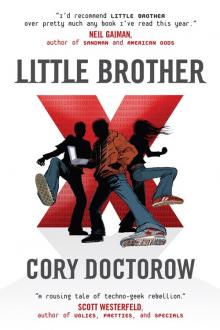Little Brother by Cory Doctorow (best books to read fiction txt) 📕

- Author: Cory Doctorow
- Performer: 0765319853
Book online «Little Brother by Cory Doctorow (best books to read fiction txt) 📕». Author Cory Doctorow
The best part of all this is how it made me feel: in control. My technology was working for me, serving me, protecting me. It wasn't spying on me. This is why I loved technology: if you used it right, it could give you power and privacy.
My brain was really going now, running like 60. There were lots of reasons to run ParanoidXbox -- the best one was that anyone could write games for it. Already there was a port of MAME, the Multiple Arcade Machine Emulator, so you could play practically any game that had ever been written, all the way back to Pong -- games for the Apple ][+ and games for the Colecovision, games for the NES and the Dreamcast, and so on.
Even better were all the cool multiplayer games being built specifically for ParanoidXbox -- totally free hobbyist games that anyone could run. When you combined it all, you had a free console full of free games that could get you free Internet access.
And the best part -- as far as I was concerned -- was that ParanoidXbox was paranoid. Every bit that went over the air was scrambled to within an inch of its life. You could wiretap it all you wanted, but you'd never figure out who was talking, what they were talking about, or who they were talking to. Anonymous web, email and IM. Just what I needed.
All I had to do now was convince everyone I knew to use it too.
Chapter 6
This chapter is dedicated to Powell's Books, the legendary "City of Books" in Portland, Oregon. Powell's is the largest bookstore in the world, an endless, multi-storey universe of papery smells and towering shelves. They stock new and used books on the same shelves -- something I've always loved -- and every time I've stopped in, they've had a veritable mountain of my books, and they've been incredibly gracious about asking me to sign the store-stock. The clerks are friendly, the stock is fabulous, and there's even a Powell's at the Portland airport, making it just about the best airport bookstore in the world for my money!
Powell's Books: 1005 W Burnside, Portland, OR 97209 USA +1 800 878 7323
Believe it or not, my parents made me go to school the next day. I'd only fallen into feverish sleep at three in the morning, but at seven the next day, my Dad was standing at the foot of my bed, threatening to drag me out by the ankles. I managed to get up -- something had died in my mouth after painting my eyelids shut -- and into the shower.
I let my mom force a piece of toast and a banana into me, wishing fervently that my parents would let me drink coffee at home. I could sneak one on the way to school, but watching them sip down their black gold while I was drag-assing around the house, getting dressed and putting my books in my bag -- it was awful.
I've walked to school a thousand times, but today it was different. I went up and over the hills to get down into the Mission, and everywhere there were trucks. I saw new sensors and traffic cameras installed at many of the stop-signs. Someone had a lot of surveillance gear lying around, waiting to be installed at the first opportunity. The attack on the Bay Bridge had been just what they needed.
It all made the city seem more subdued, like being inside an elevator, embarrassed by the close scrutiny of your neighbors and the ubiquitous cameras.
The Turkish coffee shop on 24th Street fixed me up good with a go-cup of Turkish coffee. Basically, Turkish coffee is mud, pretending to be coffee. It's thick enough to stand a spoon up in, and it has way more caffeine than the kiddee-pops like Red Bull. Take it from someone who's read the Wikipedia entry: this is how the Ottoman Empire was won: maddened horsemen fueled by lethal jet-black coffee-mud.
I pulled out my debit card to pay and he made a face. "No more debit," he said.
"Huh? Why not?" I'd paid for my coffee habit on my card for years at the Turk's. He used to hassle me all the time, telling me I was too young to drink the stuff, and he still refused to serve me at all during school hours, convinced that I was skipping class. But over the years, the Turk and me have developed a kind of gruff understanding.
He shook his head sadly. "You wouldn't understand. Go to school, kid."
There's no surer way to make me want to understand than to tell me I won't. I wheedled him, demanding that he tell me. He looked like he was going to throw me out, but when I asked him if he thought I wasn't good enough to shop there, he opened up.
"The security," he said, looking around his little shop with its tubs of dried beans and seeds, its shelves of Turkish groceries. "The government. They monitor it all now, it was in the papers. PATRIOT Act II, the Congress passed it yesterday. Now they can monitor every time you use your card. I say no. I say my shop will not help them spy on my customers."
My jaw dropped.
"You think it's no big deal maybe? What is the problem with government knowing when you buy coffee? Because it's one way they know where you are, where you been. Why you think I left Turkey? Where you have government always spying on the people, is no good. I move here twenty years ago for freedom -- I no help them take freedom away."
"You're going to lose so many sales," I blurted. I wanted to tell him he was a hero and shake his hand, but that was what came out. "Everyone uses debit cards."
"Maybe not so much anymore. Maybe my customers come here because they know I love freedom too. I am making sign for window. Maybe other stores do the same. I hear the ACLU will sue them for this."
"You've got all my business from now on," I said. I meant it. I reached into my pocket. "Um, I don't have any cash, though."
He pursed his lips and nodded. "Many peoples say the same thing. Is OK. You give today's money to the ACLU."
In two minutes, the Turk and I had exchanged more words than we had in all the time I'd been coming to his shop. I had no idea he had all these passions. I just thought of him as my friendly neighborhood caffeine dealer. Now I shook his hand and when I left his store, I felt like he and I had joined a team. A secret team.
I'd missed two days of school but it seemed like I hadn't missed much class. They'd shut the school on one of those days while the city scrambled to recover. The next day had been devoted, it seemed, to mourning those missing and presumed dead. The newspapers published biographies of the lost, personal memorials. The Web was filled with these capsule obituaries, thousands of them.
Embarrassingly, I was one of those people. I stepped into the schoolyard, not knowing this, and then there was a shout and a moment later there were a hundred people around me, pounding me on the back, shaking my hand. A couple girls I didn't even know kissed me, and they were more than friendly kisses. I felt like a rock star.
My teachers were only a little more subdued. Ms Galvez cried as much as my mother had and hugged me three times before she let me go to my desk and sit down. There was something new at the front of the classroom. A camera. Ms Galvez caught me staring at it and handed me a permission slip on smeary Xeroxed school letterhead.
The Board of the San Francisco Unified School District had held an emergency session over the weekend and unanimously voted to ask the parents of every kid in the city for permission to put closed circuit television cameras in every classroom and corridor. The law said they couldn't force us to go to school with cameras all over the place, but it didn't say anything about us volunteering to give up our Constitutional rights. The letter said that the Board were sure that they would get complete compliance from the City's parents, but that they would make arrangements to teach those kids' whose parents objected in a separate set of "unprotected" classrooms.
Why did we have cameras in our classrooms now? Terrorists. Of course. Because by blowing up a bridge, terrorists had indicated that schools were next. Somehow that was the conclusion that the Board had reached anyway.
I read this note three times and then I stuck my hand up.
"Yes, Marcus?"
"Ms Galvez, about this note?"
"Yes, Marcus."
"Isn't the point of terrorism to make us afraid? That's why it's called _terror_ism, right?"
"I suppose so." The class was staring at me. I wasn't the best student in school, but I did like a good in-class debate. They were waiting to hear what I'd say next.
"So aren't we doing what the terrorists want from us? Don't they win if we act all afraid and put cameras in the classrooms and all of that?"
There was some nervous tittering. One of the others put his hand up. It was Charles. Ms Galvez called on him.
"Putting cameras in makes us safe, which makes us less afraid."
"Safe from what?" I said, without waiting to be called on.
"Terrorism," Charles said. The others were nodding their heads.
"How do they do that? If a suicide bomber rushed in here and blew us all up --"
"Ms Galvez, Marcus is violating school policy. We're not supposed to make jokes about terrorist attacks --"
"Who's making jokes?"
"Thank you, both of you," Ms Galvez said. She looked really unhappy. I felt kind of bad for hijacking her class. "I think that this is a really interesting discussion, but I'd like to hold it over for a future class. I think that these issues may be too emotional for us to have a discussion about them today. Now, let's get back to the suffragists, shall we?"
So we spent the rest of the hour talking about suffragists and the new lobbying strategies they'd devised for getting four women into every congresscritter's office to lean on him and let him know what it would mean for his political future if he kept on denying women the vote. It was normally the kind of thing I really liked -- little guys making the big and powerful be honest. But today I couldn't concentrate. It must have been Darryl's absence. We both liked Social Studies and we would have had our SchoolBooks out and an IM session up seconds after sitting down, a back-channel for talking about the lesson.
I'd burned twenty ParanoidXbox discs the night before and I had them all in my bag. I handed them out to people I knew were really, really into gaming. They'd all gotten an Xbox Universal or two the year before, but most of them had stopped using them. The games were really expensive and not a lot of fun. I took them aside between periods, at lunch and study hall, and sang the praises of the ParanoidXbox games to the sky. Free and fun -- addictive social games with lots of cool people playing them from all over the world.
Giving away





Comments (0)